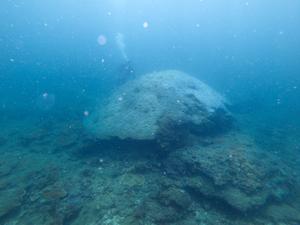image:
Massive coral in the Miri-Sibuti Coral Reef National Park.
view more
Credit: Walid Naciri
University of Leicester-led research has revealed the start of industrial deforestation of the Malaysian rainforest and its long-lasting impact on coastal ecosystems in the skeletons of corals.
Published in Scientific Reports, they used coral cores obtained off the coast of Borneo in Southeast Asia to pinpoint the beginning of industrial deforestation and demonstrate the impact on marine ecosystems.
The study brought together researchers from the UK, Malaysia, and Australia, including Professor Jens Zinke, Dr Arnoud Boom, and former Leicester PhD student Walid Naciri, from the University’s School of Geography, Geology and the Environment. The work was supported by a Royal Society Wolfson Fellowship awarded to Professor Zinke, and a PhD scholarship.. It builds upon the conclusions from a previously published pilot study where corals were found to be useful archives of past deforestation-induced sediment discharge.
A solution to data scarcity
Massive corals such as the ones used in this study can be used to fill gaps in environmental data, thanks to their ability to absorb a variety of trace elements found in surrounding seawater into their calcium carbonate skeleton during their growth. The measurement of these trace elements can then be linked to environmental conditions such as temperature, sediment, and hydrology.
Lessons from the past
Professor Zinke and former PhD student Hedwig Krawczyk, in association with local and international collaborators at Curtin University in Miri (Malaysia) and Perth (Australia), sampled coral cores using underwater pneumatic drills and obtained several metre-long cores from multiple coral colonies located at different distances from the main river mouth flowing into the coastal coral reef ecosystem, Miri-Sibuti Coral Reef National Park.
During the COVID-19 pandemic, coral cores were sent to the John de Laeter Centre within Curtin University in Perth, Australia, for trace element analyses using a laser ablation inductively coupled mass spectrometer. Walid Naciri performed some analyses in collaboration with Kai Rankenburg while visiting in 2022, with the resulting data processed and analysed in Leicester.
Professor Zinke, who led the project, explained: “The laser analysis focused on the ratio of trace elements barium and calcium (Ba/Ca) locked in coral skeletons because Ba is released from fine mud particles in river water once the river meets the salty ocean water. We use the coral Ba/Ca ratio as a proxy for sediment erosion long before any instrument was able to build a record.”
Results of 100-year-long Ba/Ca records showed that sediment concentrations in surrounding reef waters remained low from the beginning to the middle of the 20th century. After 1950, records show an increase in Ba/Ca indicative of an increase in sediment discharge, which is linked with decreasing soil stability due to the start of industrial deforestation leading to enhanced soil erosion.
Traces of organic carbon dissolved in river waters are now being studied by Leicester PhD student Hannah Kingsland to better understand interactions between tropical land and coastal ecosystems.
Corals reveal long-lasting consequences of deforestation
Former PhD student at Leicester Walid Naciri added: “Our findings allow us to make several conclusions: deforestation has an impact on the adjacent coastal system because Ba/Ca records show increasing trends, knowing pre-deforestation baseline conditions helped us to understand its impact, industrial deforestation started impacting coastal ecosystems around 1950, and assessments of deforestation impacts need to include all affected land-ocean ecosystems.
“This study provides further motivation that local governments must strive to reduce deforestation by proposing alternative means of income for local populations while the global community eases demand on palm oil and pulpwood. These initiatives must be accompanied by tropical forest restoration in an effort to reduce sediment discharge, restore crucial ecosystems, and increase carbon uptake.”
Dr Arnoud Boom, from the University of Leicester School of Geography, Geology and the Environment, said: “We have literally found a fingerprint for the onset and impact of industrial deforestation that led to enhanced soil erosion in Malaysian Borneo, affecting the Miri-Sibuti Coral Reef National Park. And all thanks to the massive corals which lived long enough to provide us with this record.”
Journal
Scientific Reports
Article Title
Corals Ba/Ca records uncover mid-twentieth century onset of land use change associated with industrial deforestation in Malaysian Borneo
Article Publication Date
1-Jul-2025
Disclaimer: AAAS and EurekAlert! are not responsible for the accuracy of news releases posted to EurekAlert! by contributing institutions or for the use of any information through the EurekAlert system.
